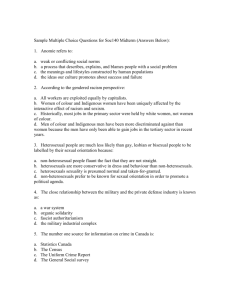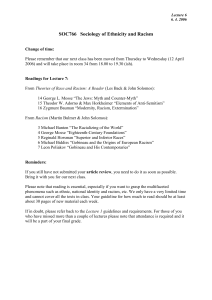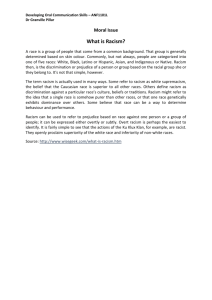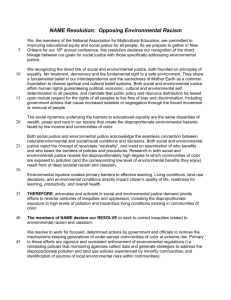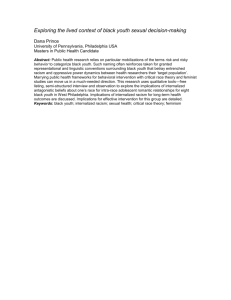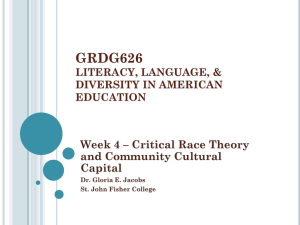Racism as a Social Determinant of Indigenous Peoples' Health
advertisement
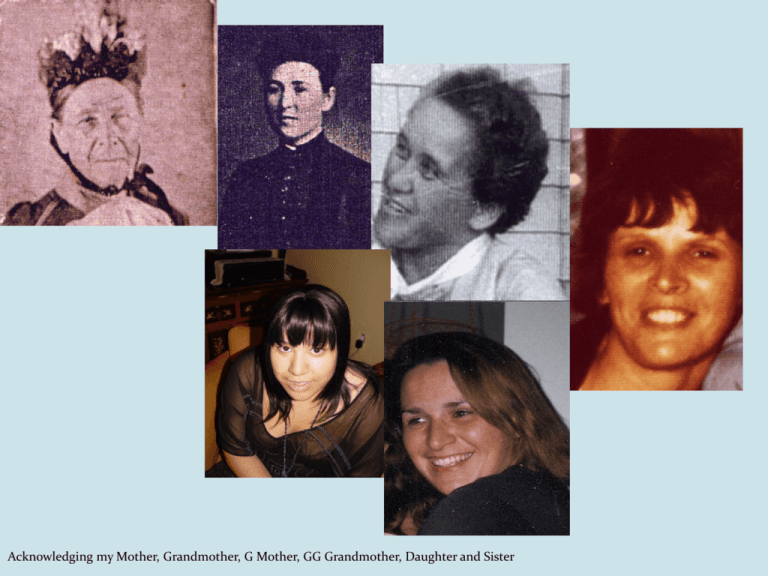
Acknowledging my Mother, Grandmother, G Mother, GG Grandmother, Daughter and Sister Racism as a Social Determinant of Indigenous Peoples’ Health Charlotte Reading Centre for Aboriginal Health Research University of Victoria Racism 1. A belief or doctrine that inherent differences among the various human races determine cultural or individual achievement, usually involving the idea that one's own race is superior and has the right to rule others. 1. A policy, system of government, etc., based upon or fostering such a doctrine; discrimination. 1. Hatred or intolerance of another race or other races. Social Determinants of Health Superiority Discrimination Hatred Forms of Racism • Structural • Stigma and Stereotyping • Social Exclusion • Interpersonal Structural - The Indian Act • Defining identity • Delegating land • Controlling systems that influence health (economic development, education, health care, etc.) Structural - Education • Does not acknowledge the history or contribution of Aboriginal peoples • Creates low expectations for Aboriginal students • Inequitable distribution of resources to facilitate learning for Aboriginal students Social Exclusion • Disconnection through legal sanctions, institutional mechanisms or systemic discrimination • Exclusion from social goods: failure of society to provide for needs such as housing and sanctions to deter discrimination. • Exclusion from social production: denial of opportunities to contribute to and participate actively in society. • Economic exclusion: unequal or lack of access to normal forms of livelihood. Stereotyping and Stigmatizing Demonized Other Idealized Other Thrifty Gene Theory “A post-mortem has already begun for the ‘thrifty-gene’ hypothesis, amid suggestions that science flirted with racism” World Health Organization (2011) The social determinants of health are the conditions in which people are born, grow, live, work and age, including the health system. These circumstances are shaped by the distribution of money, power and resources at global, national and local levels, which are themselves influenced by policy choices. The social determinants of health are mostly responsible for health inequities - the unfair and avoidable differences in health status seen within and between countries. Social Determinants of Indigenous Health Proximal Determinants Intermediate Determinants Distal Determinants Distal (Root) Determinants Most profound influence on the health of populations Represent political, economic, and social contexts that influence all determinants. Root Determinants Colonialism (historic racism), contemporary racism, Clear connection between social inequalities created by racism and the disproportionate disease, disability, violence and early death experienced by Indigenous Peoples Historic Racism “Colonization is a process that includes geographic incursion, socio-cultural dislocating, the establishment of external political control and economic dispossession, the provision of low-level social services and ultimately, the creation of ideological formulations around race and skin colour that position the colonizer at a higher evolution level than the colonized” Kelm (1998). Racism as a SDIH The collective burden of a repressive racist system has created conditions of physical, psychological, economic and political disadvantage for Aboriginal peoples. Historic, successively traumatic events affect generations through ‘historic or cultural trauma’ Contemporary racism continues to detrimentally influences the health of Indigenous peoples Conclusion Historic and contemporary racism are directly and circuitously associated with: increased stress though lack of control diminished immunity and resiliency to disease social problems decreased capacity to address ill health. Pathways to Illness Chronic Disease Infectious Disease Geographic dispersion; economic marginalization ∨ Historic trauma; contemporary discrimination ∨ Poverty; food insecurity hopelessness; childhood trauma ∨ Poor diet; obesity ∨ Intravenous drug use Diabetes HIV Conclusion Racism against Indigenous peoples has consequences not just current health status, but also for the health of subsequent generations through the environments created by physically, emotionally, mentally, or spiritually unhealthy individuals, communities and nations. Approaches to consider An Indigenous Equity Lens applied to every policy, program, service and practice implemented by local, provincial, territorial and federal government in Canada. A nation-wide Indigenous- focused antiracism social marketing campaign Thank You

